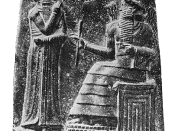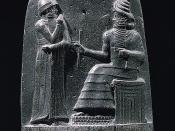The basis of Hammurabi's law code was that of equal retaliation, comparable to the Hebrew law of an "an eye for an eye."ÃÂ The law offers protection to all classes of Babylonian society; it seeks to protect the weak and the poor, including women, children, and slaves, against injustice at the hands of the rich and powerful.
The code itself, incurred that once a criminal committed a crime, he would not do it again. Reason being is because either he would be dead or his punishment would have been extremely severe. These codes basically showed that a criminal got what he deserved. Hammurabi's code helped to create an orderly society.
The code is particularly humane for the time in which it was promulgated; it attests to the law and justice of Hammurabi's rule. The laws would not be a very humane approach to live by in our society because we are use to a specific law code of our own.
In our society, people are usually given a second chance unlike Hammurabi's code of direct retaliation. If we all followed his law code, most of us would be handless or even dead. Our modern world would not be able to survive living by this code. In addition, Hammurabi's code was designed specifically for and under Hammurabi's term as ruler. For example, we don't have servants and our technology has greatly advanced since Hammurabi's term as leader.
A justice and/ or just society is where all citizens are entitled to equal treatment under the law and no favoritism is shown. This society can be achieved by first creating rules and regulations that are inclusive, meaning the rights of every individual are taken into consideration. Then, typically, people would pick a certain individual(s) to hear matters of controversy and those chosen individuals must posses a character of fairness and honesty.
Hammurabi established this law code in an attempt to establish justice in his land. He was basically trying to unify his people by having them follow a specific code that included moral values, economic activities, and everyday life.





